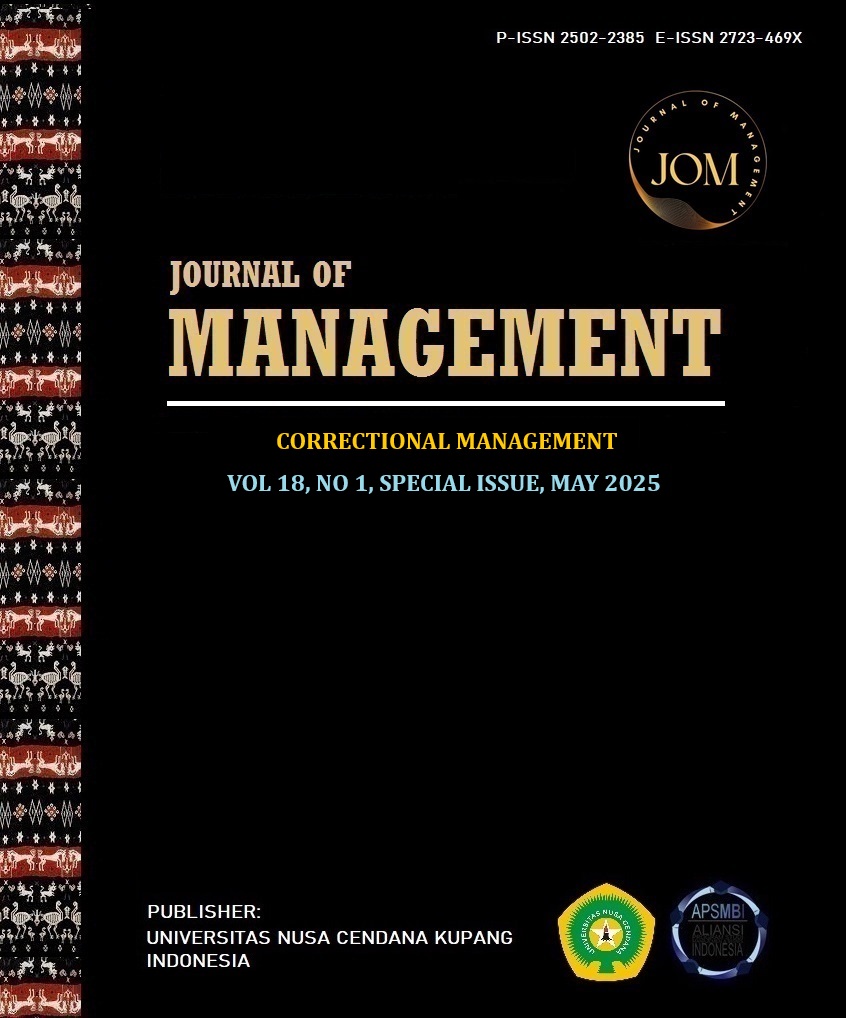THE INFLUENCE OF KNOWLEDGE SHARING BEHAVIOR ON INNOVATIVE WORK BEHAVIOR OF EMPLOYEES AT CLASS IIB YOGYAKARTA WOMEN’S CORRECTIONAL INSTITUTION
Abstract
The existence of knowledge-sharing behavior allows the knowledge base of correctional employees to increase and gives rise to opportunities for new ideas and encourages innovative work behavior of employees. The purpose of this research is to determine the influence of knowledge-sharing behavior on the innovative work behavior of employees at the Lembaga Pemasyarakatan Perempuan Kelas IIB Yogyakarta. This research uses quantitative methods with a non-probability sampling technique of 63 employees. The data analysis techniques were processed using IBM SPSS version 25. The results of the determination test shows that the knowledge sharing behavior variable has an influence of 47.5% on the innovative work behavior variable, while the remaining 52.5% is influenced by other variables not explained in this research. From the results of this research, it can be concluded that there is a positive and significant influence between knowledge-sharing behavior and innovative work behavior in the Class IIB Yogyakarta Women’s Correctional Institution.
Keywords: Knowledge Sharing Behavior; Innovative Work Behavior; Class IIB Yogyakarta Women’s Correctional Institution
Downloads
References
https://doi.org/10.55314/jcoment.v2i2.241
Baskoro, B. D., Suherman, S., Jayadi, J., & Sudarmadji, S. (2021). Pengaruh Keadilan Organisasi Terhadap Perilaku Inovatif Pekerja Konstruksi: Peran Mediasi Berbagi Pengetahuan. Maker: Jurnal Manajemen, 7(1), 26–44.
https://doi.org/10.37403/mjm.v0i0.228
Cropanzano, R., Rupp, D. E., Mohler, C. J., & Schminke, M. (2001). Three roads to organizational justice. In Research in Personnel and Human Resources Management (Vol. 20, Issue 1985). https://doi.org/10.1016/S0742-7301(01)20001-2
De Jong, J., & Den Hartog, D. (2010). Measuring innovative work behaviour. Creativity and Innovation Management, 19(1), 23–36.
https://doi.org/10.1111/j.1467-8691.2010.00547.x
Hassan, H. A., Asif, J., Waqar, N., Khalid, S., & Abbas, S. K. (2019). The Impact of Knowledge Sharing On Innovative Work Behavior. Asian Journal of Multidisciplinary Studies, 6(5), 2348–7186. https://ssrn.com/abstract=3509708
Ismail, U., Pervaiz, M. K., & Saif-ur-Rehman, M. (2020). Distributive Justice Towards Innovative Work Behavior with Mediating Effects of Human Resource Management Practices in The Hotel Industry of Pakistan. International Journal of Business and Administrative Studies, 6(3), 136–149.
https://doi.org/10.20469/ijbas.6.10002-3
Janssen, O. (2000). Job demands, perceptions of effort-rewar fairness and innovative work behaviour. Journal of Occupational and Organizational Psychology, 287–302. https://doi.org/10.15548/p-prokurasi.v1i2.1845
Khorakian, A., Mohammadi Shahroodi, H., Jahangir, M., & Nikkhah Farkhani, Z. (2019). Innovative Work Behavior in Public Organizations: The Roles of Ethical and Knowledge Sharing Behaviors. Creativity Research Journal, 31(2), 164–173. https://doi.org/10.1080/10400419.2019.1607444
Pandanningrum, G. V., & Nugraheni, R. (2021). Pengaruh Knowledge Sharing Terhadap Perilaku Kerja Inovatif Pegawai Dinas Penanaman Modal dan Pelayanan Terpadu Satu Pintu Provinsi Jawa Tengah. Diponegoro Journal of Management, 10, 1–11.
Phung, V. D. (2019). How knowledge sharing leads to innovative work behaviour: A moderating role of transformational. Journal of System and Information Technology, 21(3), 277–303. https://doi.org/10.1108/JSIT-11-2018-0148
Pratama, G. O., Lindawati, T., & Nagel, J. (2021). Pengaruh Organizational Justice Terhadap Employee Innovative Work Behavior Dengan Knowledge Sharing Sebagai Variabel Mediasi Pada Perusahaan Telekomunikasi Di Kota Surabaya. Jurnal Ilmiah Mahasiswa Manajemen, 10(2), 92–100.
https://doi.org/0.33508/jumma.v10i2.3332
Van Den Hooff, B., & Ridder, J. A. (2004). Knowledge sharing in context: The influence of organizational commitment, communication climate and CMC use on knowledge sharing. Journal of Knowledge Management, 8(6), 117–130. https://doi.org/10.1108/13673270410567675

 Niken Meileni(1*)
Niken Meileni(1*)



